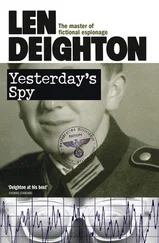Len Deighton - Spy Line
Здесь есть возможность читать онлайн «Len Deighton - Spy Line» — ознакомительный отрывок электронной книги совершенно бесплатно, а после прочтения отрывка купить полную версию. В некоторых случаях можно слушать аудио, скачать через торрент в формате fb2 и присутствует краткое содержание. Жанр: Триллер, на английском языке. Описание произведения, (предисловие) а так же отзывы посетителей доступны на портале библиотеки ЛибКат.
- Название:Spy Line
- Автор:
- Жанр:
- Год:неизвестен
- ISBN:нет данных
- Рейтинг книги:4 / 5. Голосов: 1
-
Избранное:Добавить в избранное
- Отзывы:
-
Ваша оценка:
- 80
- 1
- 2
- 3
- 4
- 5
Spy Line: краткое содержание, описание и аннотация
Предлагаем к чтению аннотацию, описание, краткое содержание или предисловие (зависит от того, что написал сам автор книги «Spy Line»). Если вы не нашли необходимую информацию о книге — напишите в комментариях, мы постараемся отыскать её.
Spy Line — читать онлайн ознакомительный отрывок
Ниже представлен текст книги, разбитый по страницам. Система сохранения места последней прочитанной страницы, позволяет с удобством читать онлайн бесплатно книгу «Spy Line», без необходимости каждый раз заново искать на чём Вы остановились. Поставьте закладку, и сможете в любой момент перейти на страницу, на которой закончили чтение.
Интервал:
Закладка:
The laughing still didn't stop. I became alarmed but the colonel seemed to have encountered it before. He looked at the blood spots that covered her, and then at me. 'It's the reaction. From what I can see, she's had a rough time.' Over his shoulder he said, 'You'd better help her, Doc.'
As he stood aside, the younger man behind him stepped forward. The middle-aged soldier handed him something. Then the boyish-looking doctor reached in through the window, grabbed her and with a minimum of fuss – in fact with no fuss at all – he put a hypodermic needle into her upper arm, right through her sleeve. The army is like that. He kept hold of her arm and watched her while she quietened down. Then he felt her pulse. 'That should do it,' he said. 'A sedative. No alcohol. Better if she doesn't eat for an hour or two. There will be an RAF doctor waiting for you at Cologne airport, I'll give you a message for him. He'll go with you all the way.'
'All the way to where?' I asked.
The young doctor looked at the colonel, who said, 'Didn't they tell you? It's always the same isn't it? They never tell the people at the sharp end. You're transferring to a transatlantic flight. It's a long journey but the air force will look after you.'
Fiona was relaxing. The laughter had completely stopped and she looked around her as if waking from a deep sleep. She let the colonel help her down from the car. 'Where are your shoes?' he asked her gallantly and tried to find them.
'I've lost my shoes,' she said flatly and pushed back her hair as if becoming aware of her scruffy appearance.
'That doesn't matter a bit,' said the colonel. 'They have lovely shoes in America.'
20
Summer is not the best time to be in southern California. Even ' La Buona Nova', the big hillside spread in Ventura County where Fiona was hidden away for her official debriefing, had long energy-sapping days when there was not a breeze off the Pacific. Bret Rensselaer was in charge. Some people – including me – had said he was too old ever to become a full-time Departmental employee again. But Bret was officially considered as Fiona's case officer. Bret had been a party to Fiona's long-term plan to defect to Moscow since that time when she first confided it to him. He'd monitored her progress. There was really no one else who could debrief her.
Bret Rensselaer was determined to make a big success of what would obviously be the last job he'd ever do. The prospect of a knighthood was never mentioned but you didn't have to be a mind-reader to know what Bret thought would be an appropriate thank-you from a grateful sovereign. No worries about Bret bowing the head for that one: he'd walk coast to coast on his knees for a K.
No one ever mentioned any kind of thank-you for me. When my salary cheque was paid I noticed that all the allowances and extras had been trimmed off it. I was down to the bare bones. When I mentioned this to Bret he said that I should remember that I wasn't having to pay for my food and keep. Good grief I said, what about the way I'm being deprived of contact with my children? I didn't mention Gloria for obvious reasons. It was Bret who brought Gloria into our conversation. He said that she had been told that I was on a special mission too secret for details to be revealed. The Department was making sure my children were happy and well cared for. He said it as if his words contained some not very veiled threat for me: I had the feeling that what Gloria was told would depend upon my good behaviour.
One day I noticed amongst the papers on Bret's marble-topped table a coloured postcard. It was van Gogh's portrait of a blue-uniformed postman, a picture of which Gloria was inordinately fond. 'Could that card be for me?' I asked him.
'No,' he said immediately and without hesitation.
'You're sure?'
'It's my private correspondence,' said Bret.
I felt like grabbing it to see but the table was big and Bret reached it before I did. He put it in a drawer. I knew it was a card from Gloria to me. I just knew it.
After that I was seldom allowed into Bret's 'office', and when I did go in there his table was always cleared. And in all that time the only correspondence that was forwarded to me was a picture of Paul Bocuse. It was postmarked Lyon and was from Tante Lisl describing the meal she'd eaten.
They put me and Fiona into a comfortable guest house set apart from the main buildings. It was complete with kitchen, dining room and a young Mexican girl to make breakfast and clean and tidy. Fiona spent four – sometimes five – hours almost every day with Bret. Neither of them emerged to eat a proper lunch. Sandwiches, fruit and coffee were sent into them and they carried right on talking. Bret had a part-time secretary but she wasn't with them during these sessions. His large and very comfortable office, with its window grilles and security locks, had maps and reference books and a computer that would feed into his screen and/or print out anything he required from all sorts of data banks. Everything Fiona said was recorded on tape and locked away in a huge safe. But there were no transcripts – all that would come later. This was the first run-through so that Bret could alert London and Washington to anything urgent.
Sometimes I went in and listened, but after a few days Fiona asked me to stay away. My presence made her too selfconscious, she said. I was hurt and offended at the time, but one-to-one was the usual form for such debriefings, and I'd never much liked having someone 'sit La' when I was doing one of these deep analysis stunts.
So I swam in the blue outdoor pool, caught up on my reading and listened to the 24 hours a day classical music on KSCA-FM or to cassettes on the big hi-fi. Most days I swam with Mrs O'Raffety, the artistic old lady who owned the place, and who had to swim on account of her bad back. And most days we took lunch together too.
I would have liked to go into Los Angeles, or, failing that, go for a beer in Santa Barbara which was much nearer. Walk along the beach, drive up the Pacific Coast Highway, do the tour of the Hearst Mansion – anything to break the monotony. But Bret was unyielding: both of us were confined inside La Buona Nova compound surrounded by the chain-link fences, the armed Mexican guards and the dogs. It was a prison, a nice comfortable prison but we were sentenced to stay there for as long as the Department decreed. I had the nasty feeling that that would turn out to be a very long term indeed. But what could I do? It was for Fiona's safety, said Bret. There was no arguing with that.
One night, soon after arriving, I'd tried to talk to Fiona about her time with Stinnes and his merry men. We were preparing for bed. She answered normally at first but then she grunted shorter replies and I could see she was getting very upset. She didn't weep or anything as traumatic as that. Perhaps it would have been better for all concerned if she'd done so: it might have helped her. But she didn't weep; she climbed into bed and curled up small and pulled the bedsheet over herself.
Each evening we'd eat dinner with Bret, our hostess and her son-in-law, an amiable lawyer. They were dull affairs at which the Mexican servants hovered all the time and the rest of us made small-talk. Sometimes I'd see Bret Rensselaer at the pool and exchange pleasantries with him. His only response to anything I said about Fiona seeming unwell, was bland reassurances. The doctor had given her a physical the day following her arrival and she had lots of vitamin pills and sleeping pills if she required them. And he told me that she'd been through a tough time and generally treated me like a neurotic mother worrying about a child with a grazed knee. But the changes I saw in Fiona were perhaps not evident to those who didn't know her so well. The changes were all small ones. She seemed shrunken and her face was drawn, and she didn't walk absolutely upright in the attractive way that I remembered so well. There was the soft and hesitant way she spoke and the diffidence she showed to everyone from me and Bret right through to the Mexican house servants.
Читать дальшеИнтервал:
Закладка:
Похожие книги на «Spy Line»
Представляем Вашему вниманию похожие книги на «Spy Line» списком для выбора. Мы отобрали схожую по названию и смыслу литературу в надежде предоставить читателям больше вариантов отыскать новые, интересные, ещё непрочитанные произведения.
Обсуждение, отзывы о книге «Spy Line» и просто собственные мнения читателей. Оставьте ваши комментарии, напишите, что Вы думаете о произведении, его смысле или главных героях. Укажите что конкретно понравилось, а что нет, и почему Вы так считаете.












